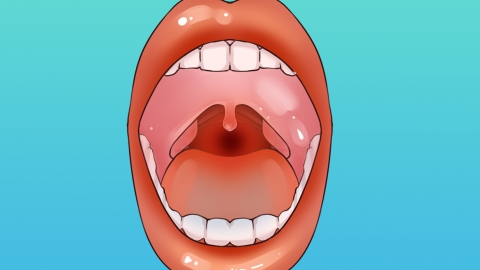Why does my throat hurt when I swallow saliva, and what should I do?
Under normal circumstances, the throat refers to the pharynx. Sore throat and pain when swallowing saliva may be caused by pharyngeal dryness, dietary irritation, acute pharyngitis, tonsillitis, epiglottitis, etc. Treatment can be conducted under a doctor's guidance through general management, medication, or surgical intervention. If discomfort occurs, timely medical attention is recommended. Detailed analysis is as follows:

1. Pharyngeal Dryness
Pharyngeal dryness is a common physiological cause of pain during swallowing. When the pharyngeal mucosa lacks sufficient moisture, it becomes dry and sensitive, resulting in pain during swallowing. It is recommended to maintain humid indoor air, such as using a humidifier; drink plenty of water to keep the pharyngeal mucosa moist.
2. Dietary Irritation
Consuming overly spicy, greasy, or hard foods may irritate or scratch the pharyngeal mucosa, causing pain during swallowing. It is recommended to maintain a bland diet, avoid excessive intake of spicy, greasy, and hard foods; chew food slowly and thoroughly during meals to reduce irritation and damage to the pharyngeal mucosa.
3. Acute Pharyngitis
Acute pharyngitis is usually caused by viral or bacterial infection. Inflammation leads to congestion and edema of the pharyngeal mucosa, causing pain during swallowing. It may also be accompanied by symptoms such as a foreign body sensation in the throat, burning sensation, and dryness. Medications such as Acyclovir tablets, antiviral oral liquid, and Amoxicillin capsules can be used under a doctor's guidance.
4. Tonsillitis
Tonsillitis is usually caused by bacterial or viral infection. Inflammation leads to swollen and congested tonsils, causing pain during swallowing. It may also be accompanied by symptoms such as high fever, chills, headache, and fatigue. Medications such as Penicillin V potassium tablets, Cefprozil dispersible tablets, and Pudilan Xiaoyan oral liquid can be used under a doctor's guidance.
5. Epiglottitis
Epiglottitis is generally caused by bacterial or viral infection. Inflammation leads to swelling of the epiglottis, blocking the laryngeal cavity and causing severe pain during swallowing. It may also be accompanied by symptoms such as difficulty breathing, trouble swallowing, fever, and chills. Medications such as Cefoperazone Sodium and Sulbactam Sodium for injection, Penicillin Sodium for injection, and Dexamethasone Sodium Phosphate Injection can be used under a doctor's guidance. In severe cases, tracheotomy may be required to maintain airway patency.
In daily life, maintaining good oral hygiene is important, including brushing teeth in the morning and evening and rinsing the mouth after meals. Strengthen physical exercise to enhance immunity. Ensure good indoor air circulation to reduce the growth of viruses and bacteria.




